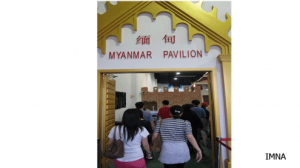The Chinese government has subsidized the pavilions of developing countries to join the 184 Shanghai Expo.
The funding for the otherwise excluded countries comes as the expo also promises to give foreign nations and companies a chance to further develop business partnerships with China and Chinese companies.
A representative of Bangladesh Pavilion, Mohammad Abdul Halim, said they came to the expo through the expo committee arrangement.
“We did not even invest a single penny on this expo. We even get a salary from the expo committee,” he said. “We get a small building here but it is fine for us.”
According to Shanghai Expo official website the Chinese government spent US $58 billion on the Expo and related infrastructures in Shanghai.
Burma, which shares a border with China and tight economic connections, was invited to the expo this year. It is the first time isolated nations, such as Burma, North Korea, Zimbabwe and Iran, are participating in a world expo.
With the theme of the Shanghai Expo being, “A Better City, A Better Life”, these isolated nations, such as Burma, increase exposure for their culture’s heritage and relation to the economy of China.
These countries’ pavilions have not been popular amongst visitors due to the little amount invested on the pavilions and exhibitions. However some people are still coming to see these pavilions because they have had no lines in which to queue as compared to the more popular pavilions where visitors have had to wait several hours.
Inside the Burmese pavilion, a Hong Kong Tourist, Yuen man-yuk reported, “I felt strange when I saw those countries showing tourist-like attractions in the World Expo because I expected to see such hi-tech exhibitions in the Expo and other fascinating new inventions.”
The Burmese pavilion, which is part of the Joint Asia Group III, shares it’s building with Laos. The Burmese theme, entitled “Better Urbanization with Harmonized Eco-System”, is designed like a Mandalay palace inside, and features a hanging picture of Shwedagon pagoda as the background. In the pavilion local customs and culture are introduced. Additionally the pavilion hosts the sales of diamonds and other Burmese products.
However there are no Burmese staff present in the pavilion, compared to other countries have their own staffs to represent their country. Visitors have reported that due to the building’s size and little visual development, the “Better Urbanization with Harmonized Eco-System” takes five minutes visit.
The offer by China to fund Burma’s pavilion is telling, Nyo Ohn Myint, chairperson of the Foreign Affairs Committee for the National League for Democracy Librated Area (NLDLA), believes. Nyo Ohn Myint says that China wants to influence those countries in term of economy and politics.
“China has a lot of border trade [between the] Burmese and Chinese government,” notes Myint. “They want Burmese government to be more efficient and independent economically within the Chinese scope, So they can grow a Chinese economic empire. That is why the Burma [is] invited [to] the Expo.”
Xinhua, a Chinese government controlled news agency, said that China and Burma will sign a series of agreements to boost existing bilateral trade, which reached US $264 million this year.
Burma has faced economic sanctions form the United States and other western countries since 1990 when the ruling military junta refused to acknowledge the results of national election that overwhelmingly elected the opposing party, the National League for Democracy, led by noble laureate Aung San Su Kyi.
Since, the question of sanctions has been increasingly divided, as 20 years later the Burmese military regime remains in power and the Burmese economy remains stagnant.
Myint added, “The Burmese government exports only raw material like timber and some kinds of natural resources. China wants Burma to be more open minded to deal with the world because the sanctions are part of the problem in that Burma cannot co-exist the international economic sector. But that [also makes] China [the] only door for Burmese government to deal with international communities.”
For some visitors that attend the Burmese pavilion at the world expo, the Chinese effort to support Burma’s fledgling pavilion, is an opportunity for awareness. A United States tourist, Matt Maar, said the China effort inviting isolated countries to the Expo is a sign of a new step to solve their problems.
“It is good because isolation is not going to solve the problem. They should be given a chance see and realize [what] benefit there is to open their countries. I think the move by China is on right track.”











